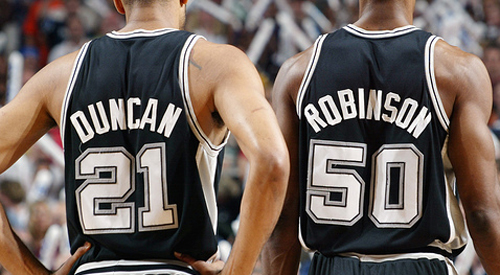
San Antonio Spurs, silent success
Time has been good to the San Antonio Spurs.
It’s a cliche, sure, but one that partially explains why they get along so well.
When I say “they”, I’m not talking about the members of the team getting along with each other – though they do – but the relationship between the franchise and the property of time itself. If Gregg Popovich had a Blackberry, Father Time would have him pinned. When Tim Duncan finally figures out how to use XBox Live, xBigPapaTx will be ready and waiting with an invite for Halo: Reach.
You’d think, after this long, they’d get sick of each other. That something or someone would finally break down, but no. The friendship that exists between the two is stronger than that. The bond goes beyond the current generation, back to a time we can barely remember and probably even before that, too.
For some reason, while other members of the league’s elite have come and gone, the Spurs have escaped unscathed by the punishing hand of age, spared for reasons that know one will ever really know.
The last time the Spurs even failed to make the post-season was in the 1996-97 campaign when David Robinson was limited to six games after breaking his foot. The last time they missed it outright was in 1988-89.
There were no smartphones or intergalactic first-person shooters the last time a healthy Spurs squad failed to contend for a playoff spot because for the past 21 seasons they’ve been as persistent as the rising sun.
[php snippet=1]
One could argue that the one they failed to qualify for playoff basketball – back in 1997 – it led to the individual best moment in franchise history anyway; Tim Duncan Day. So you can’t really chalk that one up as a loss either.
It’s horribly unfair when you think about it, a series of incongruously lopsided events resulting in one team benefiting more than the rest. A conspiracy, you might say, but not unless you were willing to admit that you were paying attention all along.
The Spurs had been benefitting not just from the wisdom of Popovich, the work ethic of Duncan or the foresight of general manager R.C. Buford, but from something intangible and transcendental.
We all know the Spurs are effective, tirelessly productive, and one of the most decorated clubs of this generation, but it’s easy to forget that the team had already strung together seven consecutive seasons of playoff basketball when Duncan first showed up in Texas.
With David Robinson on board – a current Hall of Famer himself – the Spurs were previously established in the Western Conference and frighteningly competitive.
For a few years, the eras of Robinson and Duncan overlapped. It led, as many expected, to a 1999 championship and an NBA Inside Stuff magazine cover, but more importantly the former.
A few years later it led to another championship.
From there it’s been much of the same. Though Duncan earned Finals MVP for each of the championships he won alongside Robinson, it wasn’t until the Admiral’s retirement that the team officially became his.
The transition was smooth, even flawless and the rest of the entire world failed to appreciate just how seamlessly they pulled it off. We should have been suspicious.
Nowadays the team remains Duncan’s, and the faces synonymous with the franchise aren’t just his but Manu Ginobili’s and Tony Parker’s as well. Together they managed to win Duncan his third and fourth titles in 2005 and 2007.
Currently in the 2010-11 campaign, the Spurs have led the NBA with an early 14-2 record. They’ve done so quietly and unassumingly just as they’ve done anything over the course of the past two decades.
But what does it all mean?
The essential core of the franchise has played together for over eight years – since Ginobili’s rookie season – and has been widely regarded as “too old to do much of anything” for nearly half of those.
What critics of the notoriously boring and easily forgotten San Antonio Spurs fail to realize though, is that regardless of what goes on in the rest of the league; who gets hurt, who grows old, which two superstars collaborate under the table with whom, the Spurs will always be at or near the top of the mountain, as if granted timeless immunity from the universe itself. All they have to do is show up and make it look like they’re working hard.
Tim Duncan is 34 years old now, but we’re surrounded by reasons to believe the reign won’t be ending any time soon. Whether it was the legendary careers of Duncan and Robinson, the late-draft robberies of Ginobili and Parker or career years from any number of journeyman players to pass through the system, time has consistently found ways to give the San Antonio Spurs exactly what they needed to succeed.
You’d be upset, sure, if the Los Angeles Lakers had formed a relationship with David Stern and used it to their advantage, or if the Miami Heat had been benefiting from a forbidden partnership with Batman, but nobody seems to think twice about the San Antonio Spurs and their alliance with the very premise of our universe.
Even when they’re teaming up to dominate the NBA for a third consecutive decade and there’s nothing we can do to get in between them.
[php snippet=1]

